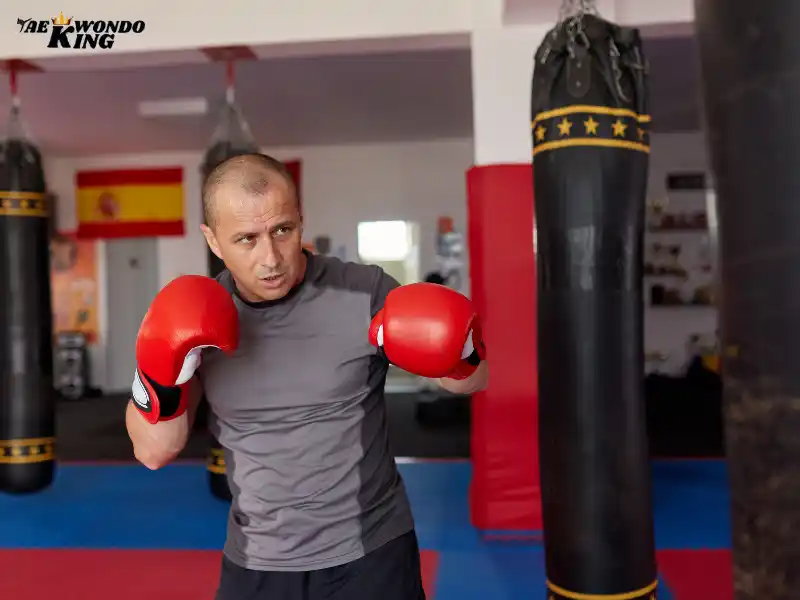
Boxing is a combat sport that involves two opponents engaging in a contest of skill, speed, strategy, and strength within the confines of a boxing ring. The objective is to land clean, effective punches while avoiding your opponent’s strikes. Boxing’s roots can be traced back to ancient civilizations, with organized competitions dating back to ancient Greece and Rome. Over the years, boxing has evolved into a well-respected sport with a rich history and a strong community of practitioners and enthusiasts. Today we are talking about A Beginner’s Guide to Boxing.
Boxing, often referred to as the “sweet science,” is a dynamic and exhilarating combat sport that has captivated individuals for generations. Whether you’re looking to improve your fitness, learn self-defense skills, or even pursue a career in the ring, boxing offers a wide range of benefits. This comprehensive beginner’s guide will equip you with the fundamental knowledge needed to step into the world of boxing with confidence and enthusiasm. How can a beginner start boxing at home?
When you are doing any exercise, whether it’s playing sports, running, dancing, lifting weights, swimming, bicycling, or even walking, you have to keep in mind that the best way to become a better athlete is by practicing regularly. With boxing, it is very important that you maintain your balance. You can learn more about how to box by watching Start Boxing videos. You might even want to watch professional boxers as well. There are lots of advantages to watching start boxing videos. You can learn a lot from them.
Benefits of Beginner’s Guide to Boxing

Beginner’s Guide to Boxing is not just a sport; it’s a comprehensive workout that brings a multitude of benefits to both the mind and body. From building cardiovascular endurance and muscular strength to enhancing mental agility and discipline, boxing offers a complete package for holistic well-being. The intense training sessions help shed excess weight, increase stamina, and improve overall fitness levels.
Moreover, Beginner’s Guide to Boxing is a potent stress reliever, channeling negative energy into powerful, controlled movements. It boosts self-confidence as practitioners control techniques and see visible progress. Additionally, the mental focus required in boxing hones concentration and sharpens reflexes. The sense of accomplishment and the camaraderie among fellow enthusiasts further elevate its appeal. Whether you’re seeking improved fitness, stress relief, or a sense of empowerment, boxing delivers remarkable results that extend far beyond the ring.
Boxing is a great sport. It makes you strong and healthy. This is because it uses your whole body as a weapon. There are many boxing exercises. Some of them include push-ups, jumping jacks, sit-ups, jumping rope, skipping, and dancing. When you are doing these exercises, you should remember to breathe deeply. This will help your heart to pump more blood into your body. You also should take a few deep breaths while you are exercising. This will increase the amount of oxygen that you are taking in. It also improves your circulation. These are some benefits of boxing.
Beginner’s Guide to Boxing Basic Techniques
A solid foundation in boxing begins with mastering basic techniques. Start by learning the proper stance and boxing footwork to maintain balance and mobility. The fundamental punches, jab, cross, hook, and uppercut, are the building blocks of your offensive arsenal. The most important boxing footwork technique. Combine these punches with defensive maneuvers like blocking and ducking to protect yourself from your opponent’s attacks.
A typical training session involves warming up your body with stretches and light exercises. Shadowboxing helps improve your form and technique without a partner. Utilize heavy bags and focus mitts for practicing combinations and power punches. Gradually, introduce sparring sessions under the supervision of experienced trainers to refine your skills in a controlled environment.
I’ve been learning to box since the early 80s, and I still train regularly. I believe that I’ve mastered the basic techniques of boxing. There are a lot of ways to practice boxing. It is very helpful to learn different types of training exercises. You can use some basic moves or you can use some advanced ones. You can start with some light jabs and then progress to a combination of punches and kicks. Some basic moves include jab, cross, right hook, lead hook, rear hook, lead foot rear uppercut, straight left, left hook, straight right, uppercut, and combinations of those moves. The more experienced you are, the more advanced moves you will do. You can improve your boxing by using a speed bag, heavy bag, or sparring. You must practice a lot to develop a strong sense of rhythm.
Beginner’s Guide to Boxing Fundamentals
Boxing, a science as much as a combat sport, relies on solid fundamentals as its cornerstone. The essence of success in the ring lies in mastering these boxing fundamentals. A proper stance, balanced footwork, and the ability to execute fundamental punches, jab, cross, lead hook, lead uppercut, rear uppercut, are pivotal for any aspiring boxer. You can exercise at home by simply doing basic boxing moves. Basic boxing training and basic boxing fight stance are supposed to be easy for beginners to attack and defend easily.
Understanding distance and range is equally crucial, enabling effective offense while minimizing vulnerability. Hand-eye coordination, honed through focused drills, improves accuracy and timing. Employing defensive techniques like blocking and weaving creates a well-rounded skill set. Heavy bag drills can help give you power in your hand.
Mental preparation is just as important. Sharpening focus and overcoming nerves are key to staying composed during bouts. By grasping these fundamentals, aspiring boxers can pave the way for a solid foundation upon which to build their boxing journey, with each skill serving as a stepping stone to becoming a well-rounded and confident practitioner in the ring.
How to achieve quick footwork in Boxing?
To achieve quick footwork in boxing, you can try the following techniques:
1. Practice agility drills: Incorporate ladder drills, cone drills, and ladder hops to improve your foot speed and coordination.
2. Shadowboxing: Focus on moving your feet quickly and smoothly while throwing punches. Visualize an opponent and practice your footwork while maintaining balance and control.
3. Jump rope: Jumping rope helps improve your foot speed, timing, and coordination.
4. Plyometric exercises: Incorporate plyometric exercises such as box jumps, squat jumps, and lateral jumps to develop explosive power and quickness in your footwork.
5. Practice pivoting and angling: Work on pivoting on the balls of your feet and angling your body to quickly change directions and create angles of attack.
6. Speed ladder drills: Use a speed ladder to improve your foot speed, quickness, and agility.
7. Shadowboxing with resistance bands: Attach resistance bands to your waist or ankles while shadowboxing to add resistance and challenge your footwork.
8. Interval training: Incorporate high-intensity interval training (HIIT) workouts that involve short bursts of intense footwork exercises followed by brief periods of rest.
9. Work with a coach or trainer: A boxing coach or trainer can provide guidance, feedback, and personalized drills to help you improve your footwork.
10. Consistency and repetition: Practice your footwork drills regularly to build muscle memory and improve your overall speed and agility.
How to achieve proper defensive skills in Boxing?
To achieve proper defensive skills in boxing, here are some tips:
1. Master the basics: Start by learning and practicing the fundamental defensive techniques such as proper footwork, head movement, and blocking techniques.
2. Keep your guard up: Always keep your hands up to protect your face and chin. This will help you defend against punches and can also create openings for counterattacks.
3. Develop good footwork: Footwork is crucial for defense. Practice moving in and out of range, circling your opponent, and pivoting to create angles. This will make it harder for your opponent to land clean punches.
4. Slip and weave: Learn how to slip and weave to avoid punches. This involves using head movement to evade incoming punches. Practice slipping to the left and right, moving your head along with your body.
5. Counterpunching: Use defensive moves to set up counterpunches. When you successfully defend against an opponent’s attack, look for opportunities to counter with your punches.
6. Sparring and drills: Regularly spar with partners of different skill levels and practice defensive drills. This will help you improve your reaction time, timing, and defensive instincts.
7. Study your opponents: Watch videos of professional boxers and analyze their defensive techniques. Try to incorporate their strategies into your own style.
8. Conditioning and reflex training: Good defensive skills require quick reflexes and stamina. Include conditioning exercises and reflex drills in your training regimen to improve your defensive abilities.
Remember, defensive skills in boxing take time, practice, and patience to develop. Always prioritize safety and consult with a qualified boxing coach for personalized guidance.
How to achieve a successful Boxing career?
To achieve a successful boxing career, here are some steps you can take:
1. Start training early: Begin training in boxing at a young age to develop the necessary skills and techniques.
2. Find a good coach: Work with a reputable boxing coach who can guide you and help you improve your skills.
3. Stay dedicated and disciplined: Boxing requires commitment and discipline. Stick to a strict training regimen and maintain a healthy lifestyle.
4. Build a strong foundation: Focus on developing your strength, speed, agility, and endurance through regular training sessions.
5. Participate in amateur fights: Gain experience by participating in amateur boxing matches and tournaments to improve your skills and build a track record.
6. Stay consistent and persistent: Boxing is a challenging sport, and success may not come overnight. Stay focused, train regularly, and never give up.
7. Network and promote yourself: Attend boxing events, and network with trainers, managers, and promoters who can help advance your career. Build a strong online presence and promote yourself through social media.
8. Stay mentally tough and resilient: Boxing requires mental strength and resilience. Learn to handle pressure, setbacks, and defeats, and use them as motivation to improve.
9. Consider turning professional: If you have achieved success in amateur boxing and believe you are ready, consider turning professional. Work with a reputable promoter and sign contracts to start your professional career.
10. Continually strive for improvement: Boxing is a lifelong journey of improvement. Always strive to learn and grow as a boxer, both inside and outside the ring.
Mental Preparation of Beginner’s Guide to Boxing
While physical prowess is essential in martial arts, the role of mental preparation is equally profound. A strong mind is the foundation upon which exceptional skills are built. Mental preparation encompasses focus, discipline, and self-belief, crucial for success in training and competitions.
Visualization techniques enhance performance by mentally rehearsing techniques and scenarios. Mindfulness and meditation to improve concentration and emotional control, fostering resilience in the face of challenges. Overcoming self-doubt and nerves is an ongoing journey, transforming apprehension into confidence.
In the realm of martial arts, a well-prepared mind can be the ultimate differentiator. Cultivating mental fortitude not only optimizes physical performance but also enriches personal growth. By embracing mental preparation, practitioners equip themselves with an invaluable tool that empowers them to conquer both the physical and psychological demands of their martial arts journey.
Safety and Injury Prevention
Protecting your hands is paramount in boxing. Hand wraps provide support to your wrists and knuckles, reducing the risk of injuries. Additionally, wearing headgear and mouth guards during sparring sessions helps safeguard your head and teeth. Listen to your body and avoid overexertion to prevent unnecessary injuries.
In boxing, athletes use their fists to strike their opponents. They can hit and kick with both feet and elbows. Keep your lead hand up, to protect your face. Boxing requires a lot of physical strength and mental focus. Athletes in boxing have to punch and kick in order to score points. These athletes must use their legs to move around the ring. If you want to learn how to box, you need to take a few lessons before you start fighting. Make sure that you watch the fights to learn what kind of punches your opponents are using.
Also, make sure that you practice the skills you’ve learned from your lessons. You can use punching heavy bags to practice your punching techniques. You can take boxing classes comfort of your home. Once you are confident with your skills, you can start practicing your boxing skills against other people in the Boxing gym. Be safe and have fun!
Taking Your Boxing Further

For those interested in competitive boxing, thorough training and preparation are necessary. Engaging in amateur bouts offers an opportunity to test your skills in a controlled setting. As you progress, consider delving into advanced techniques and strategies to elevate your performance. Whether you pursue boxing as a hobby or a lifelong passion, the journey is bound to be rewarding.
To get better at Beginner’s Guide to Boxing, you need to train yourself every day. There are many ways to improve your boxing skills. You can start by practicing hitting a heavy bag with a boxing glove. If you don’t have a boxing glove, you can practice by punching the bag with your hands. You can also practice doing jabs and hooks.
You should always be ready to block a punch when you are practicing. When you hit the bag with your fists, make sure that you are doing it right. Keep moving your arms and legs during your practice. Remember that you aim to move quickly and accurately. After you practice for a while, you’ll be ready to fight. So, get ready to box and see if you can defeat your opponent.
In conclusion,
Stepping into the world of boxing as a beginner is an exciting and transformative experience. With dedication, perseverance, and the guidance of experienced trainers, you can develop a solid foundation in boxing techniques, enhance your physical fitness, and gain invaluable self-defense skills. Remember that progress takes time, and each step forward is a testament to your commitment. Whether your goal is personal development, competition, or simply a love for the sport, boxing offers a path to self-discovery and achievement that is as challenging as it is rewarding.
FAQs
Is Boxing an effective workout for weight loss?
Boxing is a fantastic workout for weight loss as it combines cardiovascular exercise with strength training. It aids in burning calories, building muscle, and improving overall fitness.
Can Boxing help reduce stress and improve mental health?
Yes, boxing can serve as a great outlet for stress and improve mental health. The physical activity and focus required in boxing can help reduce stress and release endorphins, which can enhance mood and overall well-being. Additionally, the discipline and mental toughness developed through boxing can positively impact other areas of life.
Is Boxing a good form of exercise?
Yes, boxing is an excellent form of exercise as it combines cardiovascular workouts with strength training. It helps in improving overall fitness, building strength, increasing stamina, and enhancing hand-eye coordination. Moreover, it is a great way to relieve stress and improve mental focus.
Can anyone learn Boxing, or is it only for professionals?
Boxing is a sport that can be learned by anyone, regardless of age, gender, or fitness level. Many boxing gyms offer classes for beginners, where they can learn the basics and gradually progress. It is important to start with proper training and guidance to ensure safety and learn the correct techniques. Whether your goal is to compete or simply enjoy the sport, boxing can be a rewarding activity for everyone.

Founder, Owner, and CEO of TaekwondoKing.
He is one of the top 100 martial artists in the World and among the top 20 referees in Bangladesh.
Ehatasamul Alom is an esteemed Kukkiwon Certified Taekwondo 3rd Dan Black Belt with over 15 years of experience in this dynamic martial art. Born in Rajshahi, Bangladesh, Ehatasamul’s journey with Taekwondo began at the tender age of seven. His passion led him to compete at national and international levels, where he has bagged numerous awards and honors. He is also a member of the Taekwondo National Referee Panel.
With a Bachelor’s degree in Sports Science from the prestigious Rajshahi University, Ehatasamul has a deep understanding of the technical and scientific aspects of martial arts and some other martial arts.
In 2022, Ehatasamul created the “TaekwondoKing.com” to share his knowledge, Free Resources, Values, and Real experiences. His articles focus on Taekwondo training techniques, competition strategies, Sport Products Reviews, and the art’s rich history and philosophy. He also writes about the importance of mental fortitude and discipline, key aspects of his teaching philosophy. He has already launched many sports, Taekwondo, and health-related Free online tools. His goal is to inspire both beginners and seasoned practitioners worldwide through insightful and engaging content.
If you need any help, contact Ehatasamul Alom at any time.




